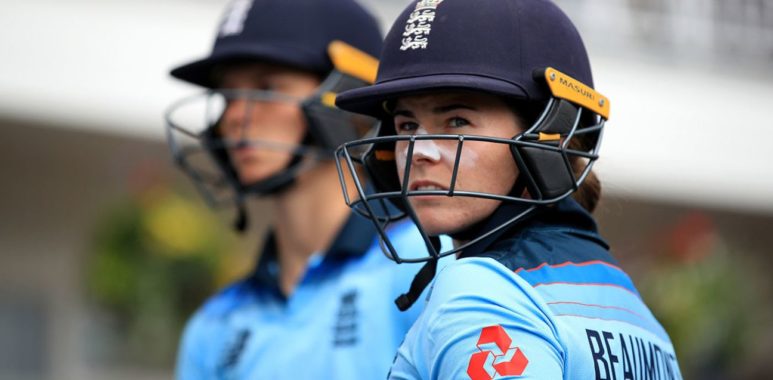
Tammy Beaumont ‘so grateful’ to West Indies as women’s summer prepares for late beginning
2020 was meant to be a huge year for women’s cricket in England and Wales. Following a T20 World Cup with a favourable group draw, England were set to play home series against South Africa and India; 40 new domestic contracts would be awarded as the new professional domestic structure shifted into place; and the launch of the Hundred would put women’s cricketers on the same platform as the men.
But things have not panned out as planned. After their T20 World Cup hopes were wiped out by the Sydney weather, England returned home and were in lockdown within a matter of days as the world began to face the reality of the Covid-19 pandemic. Since then, the bad news has been relentless: the Hundred was postponed, full domestic contracts were mothballed – albeit with 25 players signing summer retainers – and India and South Africa pulled out of their tours.
In that light, you could forgive Tammy Beaumont‘s cynicism when England’s enlarged squad were told that the ECB hoped to bring West Indies women over for a late-season tour.
“It felt like they might have just been trying to soften the blow of some really rubbish news,” Beaumont admitted. “We thought that was a carrot, but something that might not necessarily happen. As far as I was concerned, it looked like we weren’t going to get any international cricket.”
ALSO READ: ‘Women’s cricket needs this’ – Stafanie Taylor on the return to action
But not for the first time this year, Cricket West Indies (CWI) came to the rescue. Fixtures were ratified and announced less than two weeks after the ECB had first made contact with Johnny Grave, CWI’s CEO, and the touring squad arrived in Derby on Monday ahead of five T20Is at the end of the season.
“All we’d had this year was bad news: India pulling out of the tri-series, then South Africa, and the 2021 World Cup not going ahead,” Beaumont said. “For quite a while, it was knockback after knockback. For the West Indies to pull through and help us out was a relief more than anything.
“I thought it was an amazing effort by their men’s team to come, as well as their women’s team now agreeing to. They’ve had hardly any training, either together or even within islands, so it’s a really big commitment. We’re so grateful to them for taking up this opportunity to come and play; we really would have had nothing without their generosity and willingness to come.”
For Beaumont, the break came at a good time. She is only 29, but has now been playing international cricket for more than 10 years, and the disappointment of the World Cup semi-final washout at the end of another busy winter left her feeling “a bit burned out”.
She hopes that an enforced sabbatical from the game during the early weeks of lockdown will eventually prolong her international career – though having waited for so long since returning to individual training in June, she was itching to play competitively before making 2 and 51 in the Rachael Heyhoe Flint Trophy’s opening weekend.
“We started training before the men had their first Test of the summer. We’ve been doing an awful lot of waiting. For a while it was quite hard to keep going with training, thinking there might be nothing at the end of it.
“It was like I’d never held a bat before when I came back, but I think I actually got rid of a couple of bad habits just through how long it had been since I’d played. Having a break was a bit of a blessing in disguise: it was the longest I’ve had off cricket for over 10 years.
“I was getting towards a stage where I was almost resenting cricket: I was never at home, never seeing my mates, and it was always one thing after the next. I was always on the go and it was feeling a bit relentless. As much as it’s a privilege to play cricket as your job, it does get quite tiring – you get a bit burned out.
“It was a good time to have a mental break from it, which reminded me why I play the game – cricket being taken away from me helped me to really start to appreciate it and be grateful again. It’s a shame to miss six months of playing at my age, but hopefully in the long run it will make me a lot more grateful that my job is to play cricket for my country.”
“It felt like they might have just been trying to soften the blow of some really rubbish news. We thought that was a carrot, but something that might not necessarily happen”
Beaumont was initially doubtful whether West Indies would agree to tour
As for the series itself, Beaumont hopes that the narrative that dominated England’s World Cup campaign about her batting position – she was initially used out of position as a finisher before shifting up to open – will be put to bed. Despite England’s convincing wins against West Indies last summer, she is taking nothing for granted against a “very dangerous” side containing some “outrageous T20 players”, and tipped Sophia Dunkley as a fringe player who could enjoy a breakout summer.
“It’s a really interesting time for our T20 team: it’s a new cycle, and there are a few spots up for grabs. I don’t think you can ever really complain about your role, particularly with the world-class players we’ve got at the minute. Personally, I enjoy opening the most and that’s where I’d like to be, but if the team needs me to do something else then so be it.”
But perhaps the most significant feature of this reduced summer is that women’s international cricket will be shown live on free-to-air TV for the first time since 1993, with the BBC due to broadcast the third T20I; with a peak audience of 2.7 million during the men’s T20I against Pakistan last weekend, Beaumont has high hopes that it will prove to be a seminal moment.
“Getting it on terrestrial TV will open so many doors,” she said. “Hopefully young girls watching will tune in, see some role models and maybe see a path for them. It’s such a massive step for the women’s game to have that exposure. Sky have been incredibly supportive of women’s cricket over the years, but to get it onto free-to-air TV is the next step.”

